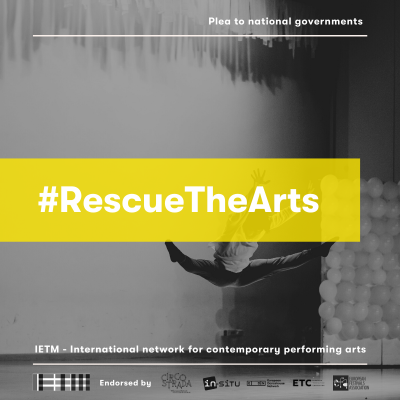
Rescue the arts: plea to national governments
You can read the plea in English below or download it in PDF in the following languages: English, French, Spanish, Catalan, Italian, German, Icelandic, Armenian, Greek, Slovak, Finnish and Danish.
This plea has been written by IETM and co-signed by Circostrada, European Theatre Convention (ETC), IN SITU, European Dancehouse Network (EDN), European Festivals Association (EFA) and Trans Europe Halles (TEH).
Since the outbreak of the corona-pandemic, an enormous part of the global population - people of various backgrounds, ages, values and social conditions - have been facing an abrupt suspension of regular life. Live encounters are regulated and limited. Some people are experiencing unexpected financial difficulties, others are suffering from health-related issues and anxieties. All these, combined with a great uncertainty about the future, is creating an enormous social distress, which will leave an indelible mark on our societies.
As often in times of turmoil, people are resorting to culture: literature, music, films, photography, virtual museums, dance and theatre performances transferred online or initiated in outdoor settings, respecting the social distance rules. The arts continue to carry a tremendous power of uniting people, even in times when it is impossible to be together physically. Culture enhances people’s well-being, inspires creative solutions, and empowers those who lack hope. The arts help to put the reality into perspective, to look at it through a critical prism and imagine a better future, even amidst the seemingly insurmountable uncertainty. We are at the threshold of a new reality, and it is up to us to find individual strength and collective resources to turn the crisis into a doorway to a better future. Culture is, undoubtedly, part of the solution.
At the same time, the cultural sector, in particular the performing arts, has been the first to suffer from the early wave of national measures taken in response to the outbreak of COVID-19. Moreover, they most probably will be the last ones to be able to resume their regular activities, once governments start softening their containment measures. Thus, the current crisis, which is only a few weeks old, has already put millions of independent artists and small companies under existential threat.
The corona-crisis had a detrimental effect on the already extremely vulnerable ecosystem of the performing arts sector, which is characterised by a high number of freelance and self-employed professionals, part-time contracts, flexible jobs, combined with limited access to social benefits. Moreover, for many art organisations, festivals and professionals, the crisis fell on the crucial time of the year when a substantial part of their annual income was supposed to be gained.
The global artistic community has been showing enormous solidarity and creativity dealing with the new reality. However, it is evident that it is up to national governments to rescue the cultural sector, which represents a vibrant social resource, carries tremendous intrinsic value and contributes to the economy.
Therefore, we call on the national governments to take the following measures, considering the urgency of the current moment and aiming at the long-term viability of the sector:
- Grant artists and cultural professionals access to unemployment payments and social benefits, and compensate their losses caused by the COVID-19 crisis.
- Support culture and the arts through the EU Coronavirus Response Investment Initiative [1].
- Create emergency and hardship funds for the cultural sector, outside of existing budgets of cultural ministries and art councils. Such instruments must be formed of finances from other budget lines specially dedicated to mitigating the consequences of the COVID-19 crisis.
- Apply flexibility to all existing funding schemes, allowing beneficiaries to decide whether they should postpone, cancel or transform activities, or extend the cycle of the funded project.
- Augment investment in culture and the arts in 2020 and beyond, aiming at their revival and sustainability.
- Preserve the internationalisation budgets, as they are crucial for the capacity-building and development of the local artistic scene.
- Initiate a far-reaching debate on the current nature of the status of the artist with a view of ensuring sustainability of artists' careers, practices and activities, as well as artists’ freedom of expression, social and financial recognition, and individual well-being.
- Explore the possibility of introducing a universal basic income to protect people from future crises and force-majeure situations.
- Integrate culture and the arts in economic and social regeneration and future-transformation strategies, recognising their tremendous value for the well-being of citizens, as well as their power to unite people, even in times when it is impossible to commune.
We demand that the above measures and other steps towards designing a long-term strategy for strengthening the sector, as well as for reviving societies and economy at large, are taken along with an inclusive and continuous dialogue with artists and cultural operators.
[1] For EU member states (including the UK).
